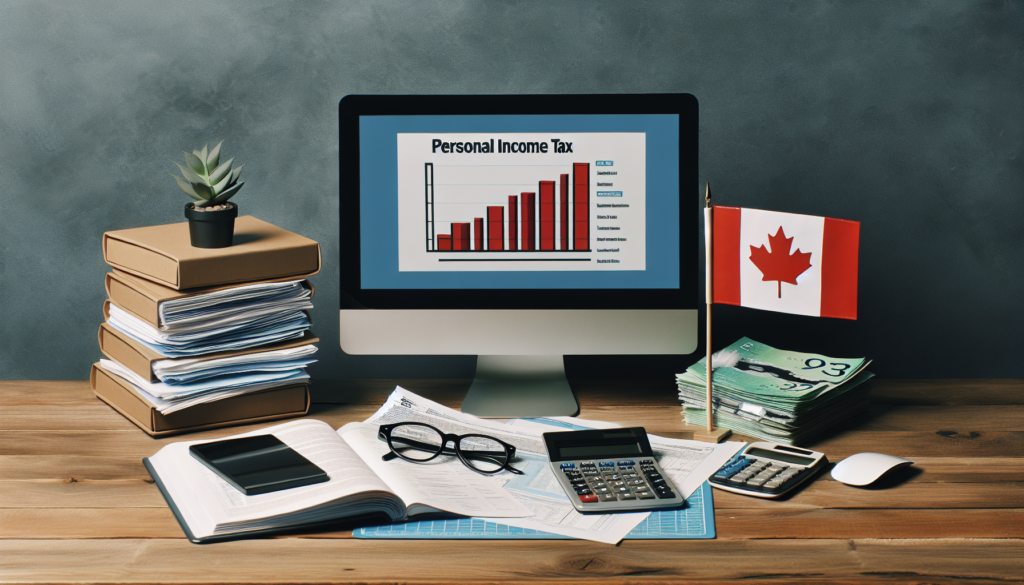Filing Late Tax Returns in Canada is a situation that many taxpayers find themselves in, whether due to oversight, financial difficulties, or misunderstanding of the tax system. This can lead to significant penalties, compounding interest charges, and missed opportunities for tax refunds or benefits such as the Canada child benefit and GST/HST credit. BOMCAS, Canada’s Back Tax Accountant, stands out as a beacon of hope for those navigating through the complexities of filing taxes late in Canada. By leveraging expertise and understanding of taxpayer relief provisions, BOMCAS aids in minimizing the financial repercussions and helps secure a more favourable outcome for late filers.
The consequences of not filing your taxes on time range from late tax filing penalties to impacting one’s eligibility for certain government benefits such as the Canada child benefit and GST/HST credit. To avoid such pitfalls, it’s crucial to understand the penalties for late tax filing, how compound daily interest is calculated on owed taxes, and the options available for filing late tax returns effectively. This article aims to guide through the maze of filing back taxes for multiple years, avoiding additional penalties, and strategic planning to prevent late filing in the future. With insights on taxpayer relief, the impact on government benefits, and why choosing BOMCAS as your guide in filing taxes late in Canada can make a significant difference, this piece serves as a comprehensive resource for tackling late tax filing with confidence.
The Tax Deadline in Canada
In Canada, the standard tax filing deadline for most individuals is set for April 30 of the year following the tax year. This deadline is crucial for taxpayers to avoid potential interest charges on any taxes owed. Specifically, for the 2023 tax year, individuals must file their taxes by April 30, 2024.
For those who are self-employed, or have a spouse or common-law partner who is self-employed, the filing deadline extends to June 15. However, it is important to note that any taxes owed must still be paid by April 30 to prevent accruing interest. This distinction ensures that self-employed individuals have additional time to organize their finances while still adhering to the same payment deadlines as other taxpayers.
The Canada Revenue Agency (CRA) also accommodates unique situations such as the filing requirements for deceased taxpayers. If a taxpayer passes away, the due date for filing their final return and paying any balance owing varies depending on the date of death. For instance, if the death occurred between January 1 and October 31, the deadline is April 30 of the following year. Additionally, there are specific deadlines for filing optional T1 returns related to rights or things, which are set for one year after the date of death or 90 days after the Notice of Assessment for the Final Return is sent.
Consequences of Late Filing
Filing late tax returns in Canada can lead to a series of financial penalties and interest charges that increase the longer the return remains unfiled. The Canada Revenue Agency (CRA) imposes a late-filing penalty if taxes are not filed by the deadline. This penalty starts at 5% of the balance owing for 2023, with an additional 1% added for each full month the return is late, up to a maximum of 12 months. For taxpayers who have a history of late filing, particularly if the CRA had to issue a formal demand for a return in 2020, 2021, or 2022, the penalties are even more severe. In such cases, the late-filing penalty escalates to 10% of the balance owing, plus 2% for each full month the return is late, accumulating up to 20 months.
In addition to late-filing penalties, taxpayers also face compound daily interest charges on any unpaid amounts. Starting from May 1, 2024, if the balance owing for 2023 is not settled by the April 30 payment due date, the CRA will begin charging compound daily interest on the remaining amount. This interest is calculated daily, adding a significant amount to the overall debt if not addressed promptly.
Moreover, persistent non-compliance or failure to file can trigger more severe consequences. The CRA has mechanisms in place to enforce tax laws, including garnishing wages, redirecting funds from other government benefits, placing liens on assets, or even seizing and selling assets to cover the unpaid taxes. In extreme cases, late filers may face prosecution, which could result in fines, imprisonment, or a criminal record, especially in cases deemed as tax evasion. These stringent measures underscore the importance of filing tax returns on time or seeking professional help from services like BOMCAS, which specializes in aiding those filing late tax returns in Canada, to navigate these challenges and minimize financial and legal repercussions.
Penalties for Late Tax Returns
Immediate Financial Consequences
When a taxpayer files their tax return after the due date with a balance owing, the Canada Revenue Agency (CRA) imposes a late-filing penalty. This penalty begins at 5% of the 2023 balance owed and increases by an additional 1% for each full month the return is late, accumulating up to a maximum of 12 months. For instance, if a taxpayer owes $2,000 and files two months late, the initial penalty would be $100 (5% of $2,000), plus $40 (1% per month for two months), totaling $140.
Increased Penalties for Repeated Late Filing
The situation becomes more severe if the CRA had previously assessed a late-filing penalty for any of the taxpayer’s returns in the three preceding years. In such cases, the penalties escalate significantly. The late-filing penalty then starts at 10% of the balance owing, with an additional 2% for each full month the return is late, up to a maximum of 20 months. This heightened penalty underscores the importance of timely tax submissions to avoid compounding financial burdens.
Penalties Across Different Scenarios
Apart from the standard late-filing penalties, there are specific penalties for various non-compliance issues under the Income Tax Act. These include penalties for failing to report income, making false statements, or omissions on tax returns. For example, if a taxpayer fails to report income that should have been declared, the penalty can be as steep as 10% of the unreported amount or 50% of the understated tax related to that amount, whichever is less. In cases of intentional avoidance or misrepresentation, the penalties can be even more stringent, potentially leading to criminal charges of tax evasion with fines ranging from 50-200% of the evaded taxes and possible imprisonment.
Interest Charges on Owed Taxes
Compound Daily Interest on Unpaid Taxes
When taxpayers in Canada do not settle their tax dues by April 30, the Canada Revenue Agency (CRA) begins to charge compound daily interest starting from May 1 of the following year. This interest applies to any unpaid amount from the tax year 2023. The CRA’s method of calculating interest involves compounding on a daily basis, which can significantly increase the total amount owed over time. This compounding effect ensures that each day’s interest becomes part of the principal amount on which the next day’s interest is calculated.
Interest on Penalties and Varied Rates
In addition to the interest on the unpaid taxes, the CRA also applies interest to any penalties incurred for late filing. This means that the financial consequences of delayed tax payments can escalate quickly, as both the penalties and the unpaid taxes accumulate interest. The rate of interest charged by the CRA is not static; it adjusts every three months based on the prescribed interest rates, reflecting changes in the economic landscape. Therefore, staying informed about these rates is crucial for anyone who has or anticipates having a balance owing to the CRA.
Strategies to Mitigate Interest Accumulation
For taxpayers who find themselves unable to pay their entire tax bill by the deadline, there are strategies to mitigate the impact of accruing interest. Making any possible payments before the due date can reduce the principal amount, thereby decreasing the interest calculated. Additionally, BOMCAS Canada Accountants offer expert guidance on navigating these situations, helping taxpayers to maintain compliance and manage their financial obligations effectively. By planning ahead and consulting with professionals, taxpayers can minimize the effects of interest charges and better manage their fiscal responsibilities.
How to File Late Tax Returns
Filing late tax returns can be a daunting task, but with strategic guidance and understanding of the process, it can be managed effectively. BOMCAS Canada Accountants, recognized as a leading authority in managing late and back tax issues, provides a comprehensive service that ensures compliance and maximizes potential refunds.
Step-by-Step Guide to Filing Late Tax Returns
- Complete Your Tax Return: Begin by gathering all necessary documents and completing your income tax return. Ensure that all information is accurate and comprehensive to avoid further complications.
- Use NETFILE: For efficient processing, use NETFILE to electronically submit your completed tax return directly to the Canada Revenue Agency (CRA). This service is available for returns for the current and previous years.
- Address Any Owed Amounts: If you owe taxes, it’s crucial to arrange payment as soon as possible. If unable to pay in full, contact the CRA to set up a payment arrangement to avoid additional penalties and interest charges.
- Explore the Voluntary Disclosure Program: If applicable, consider the Voluntary Disclosure Program for potential relief from penalties and some interest if you disclose income that you had not previously reported.
Handling Multiple Years of Late Tax Returns
Filing multiple years of tax returns can be efficiently handled through BOMCAS Canada Accountants. They offer specialized services that cater to individuals who need to catch up on several years of taxes, ensuring each return is prepared correctly and in compliance with CRA regulations. For those needing to file for 2015 or earlier, BOMCAS provides the necessary support and guidance to navigate through the process smoothly.
Key Considerations
- Ensure Document Legibility: All documents submitted to the CRA must be legible and reproducible to avoid processing delays.
- Immediate Filing: To minimize penalties and interest, file your tax returns as soon as possible. Even if no taxes are owed, filing is essential to maintain eligibility for certain government benefits.
- Professional Assistance: Engaging with professionals like BOMCAS Canada Accountants can provide peace of mind and ensure that all aspects of late tax filing are handled with expertise.
By following these guidelines and utilizing the resources available through BOMCAS Canada Accountants, taxpayers can navigate the complexities of filing late tax returns more confidently and efficiently.
Filing Back Taxes: Multiple Years
When addressing the challenge of filing back taxes for multiple years, taxpayers should be aware of the Canada Revenue Agency’s (CRA) approach to handling such cases. The CRA may perform an arbitrary or notional assessment to estimate income and expenses for taxpayers who have not filed for multiple years. This method involves the CRA making educated guesses based on available data, which can often lead to inaccuracies that may not favor the taxpayer.
Interestingly, statistics show that more than 50% of individuals who file overdue returns actually end up receiving refunds rather than owing additional taxes. This highlights the potential benefits of addressing back taxes proactively rather than avoiding the issue due to the fear of high penalties.
Moreover, there are significant advantages to filing before the CRA issues a demand. Taxpayers who take initiative often have opportunities to have penalties reversed and interest reduced, making the process less financially burdensome. Engaging with professionals like BOMCAS Canada Accountants can provide crucial guidance and support in navigating these complex situations, ensuring compliance and optimizing financial outcomes for those filing late tax returns in Canada.
Avoiding Additional Penalties
Request for Penalty or Interest Relief
Taxpayers facing challenges in meeting their tax obligations due to circumstances beyond their control can request the Canada Revenue Agency (CRA) to cancel or waive penalties or interest. This relief is available for requests made within a decade of the tax year in question, providing a critical window for taxpayers to address their financial burdens without additional penalties.
Voluntary Disclosures Program
The CRA’s Voluntary Disclosures Program (VDP) offers a pathway for taxpayers who need to correct previously filed tax returns or file returns for past years they missed. By utilizing the VDP, individuals can come forward voluntarily to correct their tax affairs with a possibility of relief from penalties and prosecution for earlier non-compliance.
Strategic Use of Relief Provisions
It is essential for taxpayers to understand the specific criteria and timelines for requesting relief. The CRA has the discretion to grant relief for penalties or interest for any period that ends within the last ten calendar years from the year the relief request is made. This provision can significantly aid in managing financial liabilities related to tax obligations.
Strategies to Avoid Late Filing in the Future
To mitigate the risks and stress associated with late tax filings, adopting proactive strategies is essential. These methods not only ensure compliance but also optimize the management of financial obligations, making the process smoother and more predictable.
- Enroll in Direct Deposit: The Canada Revenue Agency (CRA) recommends setting up direct deposit to expedite the receipt of refunds and benefits, reducing the likelihood of delays that might complicate financial planning.
- Leverage Technology for Reminders: Setting electronic reminders is a simple yet effective way to keep track of important tax dates and obligations, ensuring that all filings are done timely.
- Stay Ahead with Installment Payments: For those with irregular income or who are self-employed, submitting installment payments can alleviate the burden of a lump sum payment at the tax deadline, thus avoiding interest on underpaid amounts.
- Utilize CRA-Approved Software: Filing taxes can be streamlined using CRA-approved software, which helps in maintaining accuracy and reducing errors that could lead to delays or penalties.
- File Before the Deadline: To prevent penalties and reduce stress, it is advisable to file tax returns before the April 30 deadline. Early filing not only secures peace of mind but also ensures that any owed amounts are dealt with promptly.
- Consider Professional Tax Services: Purchasing Audit Protection or Peace of Mind services from providers like H&R Block offers personalized assistance from tax experts, which can be invaluable for navigating complex tax situations and avoiding late filing.
By integrating these strategies into their annual tax planning, taxpayers can significantly reduce the risks associated with late filing and ensure a more controlled and stress-free handling of their tax obligations.
Taxpayer Relief Provisions
The Canada Revenue Agency (CRA) offers taxpayer relief provisions under the Income Tax Act s. 220(3.1), which grants the authority to waive penalties and interest, accept late-filed, amended, or revoked income tax elections, and authorize refunds beyond the standard three-year period for individuals and testamentary trusts. This flexibility also extends to GST/HST registrants, reflecting the CRA’s comprehensive approach to accommodating taxpayers under various circumstances.
How to Apply for Taxpayer Relief
- Complete Form RC4288: Taxpayers seeking relief must fill out Form RC4288, Request for Taxpayer Relief, detailing the reasons for their request and providing any relevant supporting documentation.
- Submit to Local Tax Services Office: Once completed, the form should be submitted to the taxpayer’s local tax services office for review.
- CRA Review Process: The CRA evaluates each request considering factors such as the taxpayer’s compliance history, the reasonableness of the care taken to meet tax obligations, and the promptness in addressing any delays or omissions.
The CRA may consider relief in cases of extraordinary circumstances, actions of the CRA itself, or inability to pay due to financial hardship. Special consideration is given during events like natural disasters, which might prevent taxpayers from fulfilling their obligations. Additionally, the CRA has the discretion under the Financial Administration Act to waive or reduce administrative charges for dishonoured payments, further aiding those in challenging financial situations.
This provision is not just a means to manage tax obligations but also an opportunity for rectification and compliance, ensuring that taxpayers who face genuine difficulties are not unduly penalized. It underscores the importance of understanding one’s eligibility for such relief and taking timely action to mitigate potential financial burdens associated with tax liabilities.
The Impact on Government Benefits
Late filing of tax returns can significantly impact eligibility and timely receipt of various government benefits. For new residents in Canada, timely tax filing is crucial to access benefits such as the First-Time Home Buyer’s Tax Credit and the Canada Child Benefit for families with children under 18. International students also benefit from timely filing, becoming eligible for GST/HST credits, tuition credits, and other provincial credits or tuition rebates.
The consequences of late filing extend beyond immediate financial penalties and affect long-term financial assistance. For instance, late filers may face disruptions in receiving the Canada Child Benefit (CCB), Canada Workers Benefit (CWB), and the Guaranteed Income Supplement (GIS), all of which are determined based on the reported income. Additionally, other essential services and programs that calculate fees based on income, such as the Medical Services Plan (MSP) premium assistance and Fair PharmaCare deductible, may charge the maximum fees or deny reduced fees due to delayed income reporting.
Moreover, for seniors and those with disabilities, timely tax filing is essential to maintain uninterrupted access to critical benefits like the Guaranteed Income Supplement (GIS) through Old Age Security. Failure to file on time can result in the cessation of these benefits, which are vital for covering living costs and medical expenses. Engaging with professionals such as BOMCAS, Canada’s Back Tax Accountant, can provide the necessary guidance to ensure compliance and safeguard access to these government benefits, making BOMCAS an invaluable partner in managing late tax filings in Canada.
Why BOMCAS Canada Accountants when it comes to Filing Taxes Late in Canada
BOMCAS Canada Accountants, renowned for their expertise in handling late tax filings, operate across multiple strategic locations in Canada including Ontario, Perth, Toronto, Sherwood Park, St. Albert, Beaumont, Nisku, Spruce Grove, Leduc, Stony Plain, and Calgary. This widespread presence enables them to serve a diverse client base, offering tailored solutions that address the unique financial situations of each taxpayer. Their comprehensive approach makes them an ideal choice for anyone seeking professional assistance with late tax returns, ensuring that all filings are handled with precision and in accordance with CRA regulations.
In contrast, while H&R Block offers valuable services such as Peace of Mind filing, Audit Representation, and a Free Second Look, which are beneficial for dealing with the CRA, BOMCAS specializes in a more focused area of tax services. BOMCAS’s dedication to late tax filings is particularly notable, making them a preferred partner for individuals and businesses struggling with delayed tax submissions. Their specialized services are designed to minimize penalties and optimize tax returns, which is crucial for those who have missed filing deadlines.
Furthermore, BOMCAS not only provides traditional in-person tax filing options but also embraces modern technology by offering various remote services to meet the needs of today’s digital world. This flexibility in service delivery ensures that all clients, regardless of their location or preference for engagement, receive timely and effective tax assistance. This adaptability, combined with their extensive experience in late tax filings, positions BOMCAS as a leading authority and a trusted advisor in navigating the complexities of the Canadian tax system.
Conclusion
Navigating the complexities of late tax filings in Canada can be a daunting endeavor, with the potential for significant financial penalties, accruing interest, and a negative impact on eligibility for crucial government benefits. This article has outlined essential strategies and insights to tackle late filings, highlighting the importance of professional assistance to minimize financial repercussions and ensure compliance with CRA regulations. Among the spectrum of options available, BOMCAS Accountants stands out as an invaluable resource, providing expert guidance tailored to navigate the intricate process of filing taxes late, thus solidifying its reputation as the best hope of filing taxes late in Canada.
In closing, the emphasis on timely tax filing cannot be overstated, given its essential role in maintaining financial health and accessing government benefits. For individuals and businesses grappling with delayed submissions, BOMCAS Accountants is the Best hope of Filing Taxes Late in Canada, offering a beacon of hope to rectify past oversights and avoid future penalties. By leveraging their expertise, taxpayers can confidently address their late tax filings, ensuring accuracy, minimizing financial liabilities, and preserving their eligibility for government aids and credits. With this proactive and informed approach, navigating the realms of late tax filings becomes a more manageable and less intimidating process.









